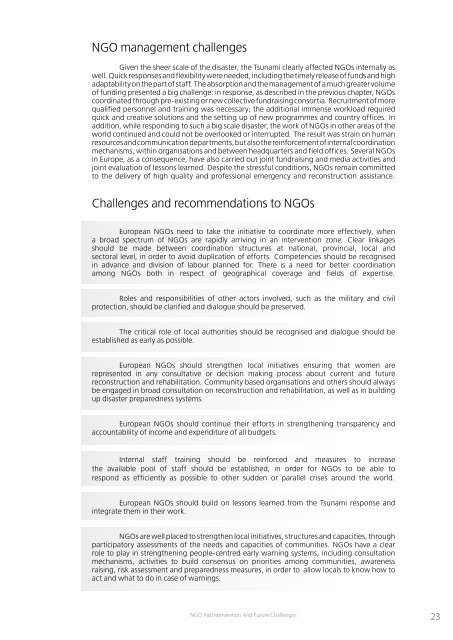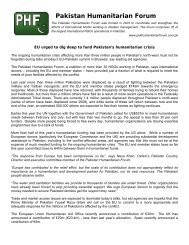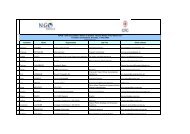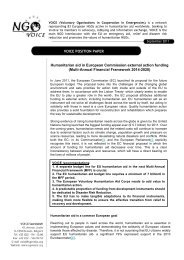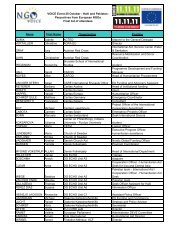Tsunami one year after, NGO aid intervention and future ... - VOICE
Tsunami one year after, NGO aid intervention and future ... - VOICE
Tsunami one year after, NGO aid intervention and future ... - VOICE
Create successful ePaper yourself
Turn your PDF publications into a flip-book with our unique Google optimized e-Paper software.
<strong>NGO</strong> management challenges<br />
Given the sheer scale of the disaster, the <strong>Tsunami</strong> clearly affected <strong>NGO</strong>s internally as<br />
well. Quick responses <strong>and</strong> flexibility were needed, including the timely release of funds <strong>and</strong> high<br />
adaptability on the part of staff. The absorption <strong>and</strong> the management of a much greater volume<br />
of funding presented a big challenge: in response, as described in the previous chapter, <strong>NGO</strong>s<br />
coordinated through pre-existing or new collective fundraising consortia. Recruitment of more<br />
qualified personnel <strong>and</strong> training was necessary; the additional immense workload required<br />
quick <strong>and</strong> creative solutions <strong>and</strong> the setting up of new programmes <strong>and</strong> country offices. In<br />
addition, while responding to such a big scale disaster, the work of <strong>NGO</strong>s in other areas of the<br />
world continued <strong>and</strong> could not be overlooked or interrupted. The result was strain on human<br />
resources <strong>and</strong> communication departments, but also the reinforcement of internal coordination<br />
mechanisms, within organisations <strong>and</strong> between headquarters <strong>and</strong> field offices. Several <strong>NGO</strong>s<br />
in Europe, as a consequence, have also carried out joint fundraising <strong>and</strong> media activities <strong>and</strong><br />
joint evaluation of lessons learned. Despite the stressful conditions, <strong>NGO</strong>s remain committed<br />
to the delivery of high quality <strong>and</strong> professional emergency <strong>and</strong> reconstruction assistance.<br />
Challenges <strong>and</strong> recommendations to <strong>NGO</strong>s<br />
European <strong>NGO</strong>s need to take the initiative to coordinate more effectively, when<br />
a broad spectrum of <strong>NGO</strong>s are rapidly arriving in an <strong>intervention</strong> z<strong>one</strong>. Clear linkages<br />
should be made between coordination structures at national, provincial, local <strong>and</strong><br />
sectoral level, in order to avoid duplication of efforts. Competencies should be recognised<br />
in advance <strong>and</strong> division of labour planned for. There is a need for better coordination<br />
among <strong>NGO</strong>s both in respect of geographical coverage <strong>and</strong> fields of expertise.<br />
Roles <strong>and</strong> responsibilities of other actors involved, such as the military <strong>and</strong> civil<br />
protection, should be clarified <strong>and</strong> dialogue should be preserved.<br />
The critical role of local authorities should be recognised <strong>and</strong> dialogue should be<br />
established as early as possible.<br />
European <strong>NGO</strong>s should strengthen local initiatives ensuring that women are<br />
represented in any consultative or decision making process about current <strong>and</strong> <strong>future</strong><br />
reconstruction <strong>and</strong> rehabilitation. Community based organisations <strong>and</strong> others should always<br />
be engaged in broad consultation on reconstruction <strong>and</strong> rehabilitation, as well as in building<br />
up disaster preparedness systems.<br />
European <strong>NGO</strong>s should continue their efforts in strengthening transparency <strong>and</strong><br />
accountability of income <strong>and</strong> expenditure of all budgets.<br />
Internal staff training should be reinforced <strong>and</strong> measures to increase<br />
the available pool of staff should be established, in order for <strong>NGO</strong>s to be able to<br />
respond as efficiently as possible to other sudden or parallel crises around the world.<br />
European <strong>NGO</strong>s should build on lessons learned from the <strong>Tsunami</strong> response <strong>and</strong><br />
integrate them in their work.<br />
<strong>NGO</strong>s are well placed to strengthen local initiatives, structures <strong>and</strong> capacities, through<br />
participatory assessments of the needs <strong>and</strong> capacities of communities. <strong>NGO</strong>s have a clear<br />
role to play in strengthening people-centred early warning systems, including consultation<br />
mechanisms, activities to build consensus on priorities among communities, awareness<br />
raising, risk assessment <strong>and</strong> preparedness measures, in order to allow locals to know how to<br />
act <strong>and</strong> what to do in case of warnings.<br />
<strong>NGO</strong> Aid Intervention And Future Challenges<br />
23


